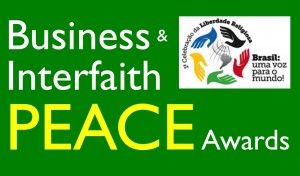Global Awards: Objectives
 The Global Business & Interfaith Peace Awards are planned to be presented in the host city of each summer and winter Olympics, beginning with Rio 2016. The objectives of the awards are to be in harmony with the objectives of the United Nations Global Compact’s Business for Peace (B4P) platform.
The Global Business & Interfaith Peace Awards are planned to be presented in the host city of each summer and winter Olympics, beginning with Rio 2016. The objectives of the awards are to be in harmony with the objectives of the United Nations Global Compact’s Business for Peace (B4P) platform.
Overall Aims
The overall aims of this project are to:
(a) Promote peaceful and inclusive societies for sustainable development, provide access to justice for all, and build effective, accountable and inclusive institutions at all levels, focusing on engagement with businesses to promote interfaith understanding and peace
(b) Expand and deepen private sector action in support of interfaith understanding and peace in the workplace, marketplace and local communities
(c) Help businesses play a central role in sustaining the openness – including interfaith understanding – on which development and prosperity depend
(d) Advance the implementation of the Global Compact Principles in challenging operating environments and catalyze collaborative action to advance interfaith understanding and peace
(e) Through business, unite people under a common objective to come together to advance business goals that include building peace by breaking down barriers between communities, religions and regions
Strategic Outcomes
The expected outcomes of this partnership are:
(1) Greater awareness among companies of how they can implement the 10 principles in high-risk areas, focusing on engagement with businesses to promote interfaith understanding and peace
(2) Greater transparency and disclosure in company contributions to interfaith understanding and peace
(3) Create a network of businesses and catalyze corporate action and partnerships to support interfaith understanding and peace in the workplace, marketplace, and in local communities
(4) Enhanced local ownership of B4P through local priorities – learning, dialogue, partnerships – by having a local business in Brazil take the lead on this “Made in Brazil” global initiative by carrying it forward as a to-be-formed Brazilian B4P local network to promote interfaith understanding and peace in Brazil and the world at large
(5) Increased advocacy and outreach to businesses on interfaith understanding and peace
(6) Increased capacity, knowledge and thought leadership for businesses on interfaith understanding and peace
The Strategic Need
According to the Pew Research Center, approximately three-in-four people today (73%) live in countries with high levels of social hostilities involving religion. But, interfaith understanding – and its contribution to peace – is in the interest of business.
— Recent research shows that economic growth and global competitiveness are stronger when social hostilities involving religion are low and government respect for, and protection of, the universally recognized human right of freedom is high.
— Interfaith understanding also strengthens business by reducing corruption and encouraging broader freedoms while also increasing trust and fostering respect. Research shows that laws and practices stifling religion are related to higher levels of corruption. Similarly, religious freedom highly correlates with the presence of other freedoms and a range of social and economic goods, such as better health care and higher incomes for women.
— Positively engaging around the issue of interfaith understanding also helps business to advance trust and respect with consumers, employees and possible partner organizations, which can give companies a competitive advantage as sustainability and ethics come to the forefront of corporate engagement with society.
— With the shared vision of a more sustainable and inclusive global economy that delivers lasting benefits to people, communities and markets, it is clear that companies can make significant contributions to advancing interfaith understanding and peace through both core business and outreach activities. The examples in the joint UNGC-RFBF publication, “Business: A Powerful Force for Supporting Interfaith Understanding and Peace,” offer an important step forward in providing companies with guidance on why and how they can make practical contributions in this area – in ways benefitting both their business and the societies where they operate.
More generally, high-risk and conflict-affected areas are home to over half of the world’s population living on less than $1.25 a day. Violent conflict disrupts markets and business opportunities. If the world had been 25% more peaceful in 2010 – the global economy would have gained an additional economic benefit of over US$2 trillion. Company materiality is tied to the health of the communities where they operate. Long-term financial success goes hand-in-hand with social and environmental responsibility.



